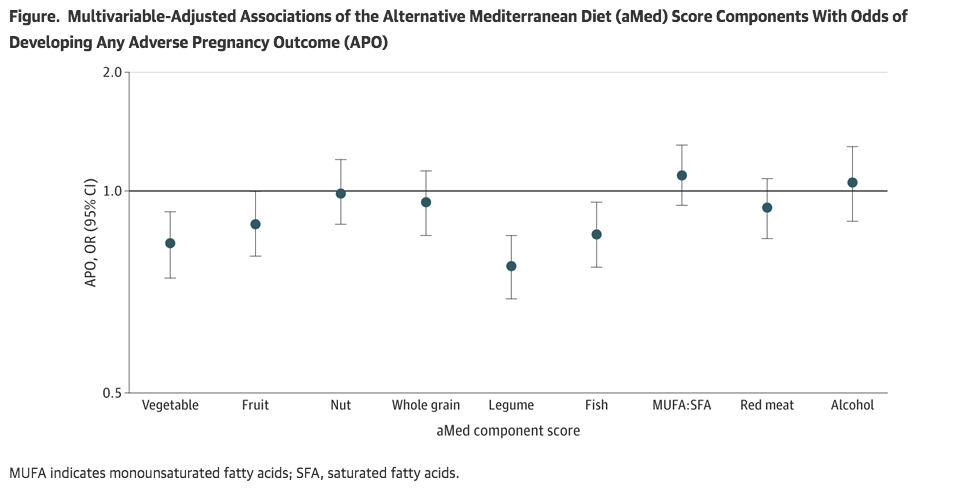
Women who follow a Mediterranean diet pattern—high in fresh vegetables and fruits, nuts, whole grains, legumes, and fish, but low in saturated fats, red meat, and processed foods—have a markedly lower risk of gestational diabetes, eclampsia, pre-eclampsia, and other adverse outcomes of pregnancy.
That’s the key signal from a new study of nearly 8,000 geographically, racially, and ethnically diverse US women. The data, published in late December 2022, in JAMA Network Open, showed an overall 21% reduction in adverse pregnancy outcomes (APOs) among the women who stuck closely to the Mediterranean diet.
Moreover, there appeared to be a dose-response association between degree of adherence and reduction of risk.
Large Cohort Study
“To our knowledge, our study represents the largest population-based US prospective cohort study examining a Mediterranean diet pattern around the time of conception and its association with odds of developing any APO and individual APOs,” writes lead author Nour Makarem, PhD, of the Department of Epidemiology at Columbia University’s Irving Medical School, New York, NY.
The study, known as the Nulliparous Pregnancy Outcomes Study: Monitoring Mothers-to-Be (nuMoM2b), is also “the first to evaluate potential differences in these associations by maternal age, BMI, race, and ethnicity.”
“A woman’s periconceptual diet may be reflective of general nutritional habits and future diet, and represents an important potential target for reducing APOs and extending a healthy lifespan.”
–Nour Makarem, PhD, Irving Medical School, Columbia University

Dr. Makarem is a member of a multicenter team that includes researchers from University of California, San Diego; University of Pittsburgh; Indiana University School of Medicine; Northwestern University, Chicago; University of Pennsylvania, Philadelphia; and Cedars-Sinai Medical Center, Los Angeles.
Collectively, they recruited 10,038 first-time pregnant women between October 2010 and September 2013. In the final cohort of 7,798 women, the mean age was 27.4 years, and nearly 10% (n=754) were age 35 and older.
The cohort included: 4.3% who identify as Asian (n = 337), 16.6% Hispanic (n = 1294), 10.5% non-Hispanic Black (n = 816), and 63.9% non-Hispanic White (n = 4986). Nearly half (3718) were college-educated or equivalent; 64.5% were married. Nearly one fifth of the subjects (n=1522) were obese at the time of enrollment.
The “aMed” Score
The researchers assessed eating patterns around the time of conception using the modified Block 2005 Food Frequency Questionnaire (FFQ)—a comprehensive, standardized evaluation tool–at the first study visit between 6 weeks and 13 weeks of gestation. The Block FFQ is semiquantitative, and enables researchers to estimate someone’s habitual dietary intake over the previous 3 months. It generates data on the amount and consumption frequency of roughly120 food and beverage items, 52 nutrients, and 35 food groups.
The version used in this pregnancy study was slightly modified from the original, to include questions about additional sources of omega-3 fatty acids.
For all APOs taken together, the women with the highest aMed scores had a 21% adjusted risk reduction compared with those in the low aMed subgroup. For preeclampsia and eclampsia taken together, a high adherence to the Mediterranean diet gave a 28% adjusted risk reduction.
Based on the FFQ data, Makarem and colleagues calculated an “aMed” score for each patient, indicating the degree to which she ate in accordance with Mediterranean diet patterns during the peri-conceptional and early gestational period.
The aMed score aggregates 9 key components: for vegetables, fruits, nuts, whole grains, legumes, fish, and monounsaturated to saturated fat ratio scored one point per item if intake was above the median; those whose intake was at or below median received 0 points per item.
For red and processed meats, those with intakes below the median were assigned a score of 1, while those who consumed above-median amounts were assigned a score of 0.
Women who drank between 5 and 15 g/d of alcohol–roughly one 12-oz can of beer, 5 ounces of wine, or 1.5 ounces of liquor per day, received a score of 1; otherwise, they received a score of 0.
Each woman’s overall aMed score was a summation of the assigned points, ranging from 0 to 9. A higher score indicates close adherence to the classic Mediterranean diet patterns described by Antonio Trichopoulou and colleagues in their landmark 2003 study of mortality reduction in a cohort of 22,000 Greek adults.
“To our knowledge, our study represents the largest population-based US prospective cohort study examining a Mediterranean diet pattern around the time of conception and its association with odds of developing any APO and individual APOs.”
Roughly 30% of the participants in the nuMoM2B cohort had scores in the range of 6-9 points, indicating high concordance to Mediterranean style eating, while 38% had scores of 0-3, suggesting low concordance. Those with scores of 4-5 points were considered to be moderately adherent. The median score across the full cohort was 4.3 points.
Clear Risk Reduction
Makarem and colleagues closely tracked incidents of gestational hypertension, preeclampsia or eclampsia,gestational diabetes, preterm birth (defined as medically indicated or spontaneous live birth at <37 weeks’ gestational age), delivery of a small-for-gestational-age infant (<5th percentile by Alexander nomogram), or stillbirth.
The data show a clear pattern of risk reduction associated with high adherence to Mediterranean-style eating habits.
For all APOs taken together, the women with the highest aMed scores had a 21% adjusted risk reduction compared with those in the low aMed subgroup. For preeclampsia and eclampsia taken together, a high adherence to the Mediterranean diet gave a 28% adjusted risk reduction.
For gestational diabetes, which affected 300 women in the cohort, a high aMed score was associated with a notable 37% adjusted risk reduction (Makarem N, et al. JAMA Open. 2022).
Is Med Diet Right for Everyone?
The Mediterranean diet is consistently ranked as one of the healthiest in the world. But given that it evolved in a particular region—mainly Southern Europe and coastal North Africa—some people have questioned whether it is ideal for everyone.
The nuMoM2B investigators looked at their data through the lens of race and ethnicity, and found that the association between high adherence to Mediterranean patterns and low risk of APO was consistent across racial and ethnic groups. There were no significant differences in risk patterns between the Asian, Hispanic, non-Hispanic White, non-Hispanic Black, or any other ethnic subgroup.
But racial and socioeconomic variables did affect the likelihood that a woman would show Mediterranean-style eating habits at the time of gestation. The patients with the highest aMed scores were more likely to be: non-Hispanic White, married, older, never-smokers, and college-educated.
Makarem and colleagues also discovered an interesting age-associated difference: the relationship between high aMed score and reduced APO risk was stronger for the women aged 35 or greater than for those below age 35.
It’s All About the Veggies
Globally, there are a number of dietary patterns that emphasize high intake of vegetables, fruits, nuts, legumes and seafood, and limited intake of red meat, dairy, and processed foods. People who follow these diets—even though they’re not “Mediterranean” per se—would presumably score high on the aMed scale.
Based on the nuMoM2B data, it seems that the key factor for APO risk reduction is the intake of plant-based foods.
The researchers looked at the relationship between APO risk and the individual sub-components of the aMed score, and found that it was a high intake of vegetables, fruits, and legumes metrics that were most strongly associated with lower odds of developing any APO. The women with the highest vegetable intake had a 17% lower risk than those with the lowest. Those who ate the most legumes had a 23% lower risk.
Fish also conferred a risk-mitigating effect: the women who ate the most fish had a 14% lower risk of APOs than those who ate the least amout.

The component scores for intake of nuts, whole grains, fats, red meat, and alcohol did not show significant associations with overall APO risk.
“For preeclampsia or eclampsia, higher intakes of vegetables, fruits, and fish were associated with lower risk, while higher intakes of vegetables and lower intakes of red and processed meat were associated with lower odds of developing gestational diabetes,” the investigators reported.
Public Health Implications
“Taken together, our findings demonstrate that in US women, adoption of a Mediterranean diet pattern may represent an important lifestyle approach for the prevention of APOs, particularly in women with advanced maternal age among whom risk for APOs is elevated.”
Pregnancy-related mortality is now on the rise in the US, reversing more than a century of progress, according to a Center for Disease Control and Prevention’s 2022 National Center for Health Statistics report.
Racial and socioeconomic variables affect the likelihood that a woman would show Mediterranean-style eating habits at the time of gestation. Those with the highest aMed scores were more likely to be: non-Hispanic White, married, older, never-smokers, and college-educated.
Though lethal APOs are still relatively rare, women who experience one or more APOs are at increased risk for long-term metabolic disorders and cardiovascular disease.
The nuMoM2B study underscores the significant impact that diet can have on a woman’s overall health, and by extention the health of her newborn.
“A woman’s periconceptual diet may be reflective of general nutritional habits and future diet, and represents an important potential target for reducing APOs and extending a healthy lifespan,” write Makarem and her co-authors.
“Our findings add to the growing body of evidence demonstrating that the Mediterranean diet pattern may play an important role in preserving the health of women across the lifespan, including during pregnancy.”
END







